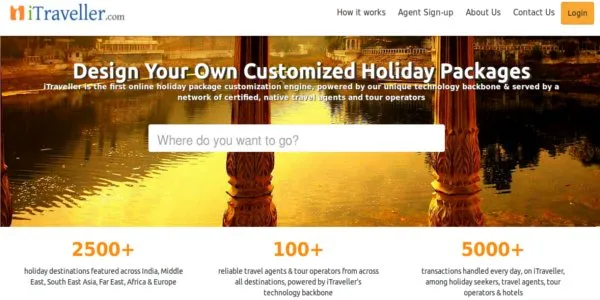Travel product company iTraveller attracts 450+ enterprise users in one year

Late in September 2011, Shiju Radhakrishnan returned from Singapore to start iTraveller along with Sanjay Kumar, Chitra Parija and Nisanth Kumar. Originally in its first avatar, iTraveller just had a consumer facing screen which allowed travellers to plan and book their holidays. It had a few other features to facilitate the planning. In those days, the team also handled the delivery of services i.e. booking hotels, arranging transportation etc, for some destinations in India.
The company was selected for the Startup Village incubation program which helped it sustain and give the idea a better shape. The company saw some good traction and was also the winner of eSparks 2013. Over the years, Shiju and his team felt the need to branch out because cracking the revenue nut is always a rather long term game with a B2C product. Hence, in April 2013, iTraveller launched their B2B offering. “With this, we limited ourselves to technology and digital marketing -- we started powering some of the native tour operators, who acted as suppliers on our platform,” says Shiju.
The consumers who create their itineraries on iTraveller get to book their holidays with one of the listed suppliers. The key aspect is that all the suppliers who are on the platform have fully automated sales and operations at the back end, using iTraveller’s supply chain automation platform. “This ensures a uniform customer experience, which is process driven and scalable,” says Shiju.
With such a model getting bigger clients seems to be a rather big challenge but in this one year, iTraveller has acquired 484 enterprise users, including 54 paid ones. “Among the paid enterprises, 18 of them are designated as suppliers, who handle the service delivery of travellers booking their holidays on iTraveller. The free travel agents (apart from 54 paid users) use some of the free features of the product to automate their sales,” says Shiju. Most of the B2B clients are based across India. Some of the recent clients are Estire Holidays- Cochin, Nomads Holidays - Nagpur, CocoKerala - Cochin, Parivaar India - Guwahati, Holiday Triangle – Cochin, etc.

In a crowded market, iTraveller has been able to create a space for itself. Talking about the USP of the product, Shiju says, “Ours is a supply chain automation platform for holiday packages value chain. It offers two key aspects -- automation and demand-supply mapping.” iTraveller has had a journey full of lessons. Shiju tells us that while talking to the customers, they realized that small businesses in India don’t want to buy technology only for automation, there has to be a very visible proof for increase in revenues. “We learnt this early on and designed the platform to have technology enabled automation compliment with avenues of generating more sales through the same. As it evolved, we now have iTraveller which is more like an ecosystem where travellers plan and book their holidays whereas tour operators fulfil the delivery,” says Shiju.
Based out of Bangalore, iTraveller is a small team of six and has two revenue channels now -- first from the transactions, which is a percentage of the transactions done by end consumers, and second as subscription fees from the enterprises which are using the application as an automation platform. For the enterprise product, there is a transaction-based model and a subscription model.
- For transactions: iTraveller charges a percentage of the sale value (a flat 5%). When the end users make payments, iTraveller deducts this component before transferring the rest to the respective tour operator.
- For subscription: There are two components for subscription fees -- the first is a one-time setup fees paid at the time of signing up with iTraveller and the second is a monthly recurring fees, paid based on the usage of the platform. For example, a small tour operator will pay INR 25,000 as setup fees and INR 3,000 as monthly recurring fees whereas for a large tour operator, it will be anything up to INR 10 lakhs and INR 60,000 respectively. There are five buckets of pricing plans based on the size of the organization.
As present, iTraveller has 10 holiday destinations featured, with at least two fully automated suppliers from each of these destinations handling the fulfilment. “In the next one year, we intend to add 10 more destinations within India and five more overseas. Having this scale will substantially increase our transaction-based revenue. Parallelly, there have been efforts to increase the subscription revenue, although this channel is inherently a bit slow in nature,” says Shiju about the future plans.
Website: iTraveller







